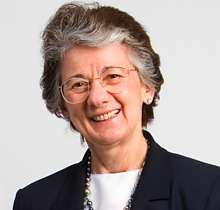Colwell Reflects on Global Water Issues

Rita Colwell, a Distinguished University Professor in the University of Maryland Institute for Advanced Computer Studies, recently gave the keynote address at a campus forum discussing the health of the Chesapeake Bay.
“Ensuring a Clean and Healthy Chesapeake Bay” featured experts on storm water management, water use and reuse, the bay’s aquatic life, and more.
Before speaking at the forum, Colwell sat for an interview with Samantha Watters, assistant director of communications for the College of Agriculture & Natural Resources.
Q: What do you see as the biggest challenges facing humanity today and how have they helped advance your thinking and professional pursuits?
A: The biggest challenge is water, it really is. Right now, we are fighting over oil, but we’ve already got fights going on over water, who gets to use it, and this clearly is an agricultural problem. It’s a negotiation that has to be done between community use, agricultural use, and water recycling that is necessary for sustainability. It’s a tradeoff between water for drinking, domestic use, agricultural application, industry, recreation, you name it. And the assumption is that since 70 percent of the earth is covered with oceans, we must have plenty of water, but that water isn’t really available. Also, the tragedy of dealing with climate change means the glaciers are melting, and it’s a real problem because these glaciers feed freshwater drinking systems. We are going to be seeing huge climate change migrations away from areas drastically affected, and exacerbation of political problems that are all intertwined and connected by water.
Q: How does interdisciplinary science enter into solving these global issues?
A: Science has done a great job over the years tackling issues of reductionism—reducing problems to the molecular level, the galaxy level, and so on. But now, to solve the issues our planet is facing, we will need to be thinking at a much more holistic level. And agriculture is a prime example of the necessity of integration—it is a very complex system. The issues are complex, but they are solvable, and collaboration and machine learning can help us get there. It will be interesting to see what can come out of the analysis of interdisciplinary work across all these systems with the rise of big data approaches. Agriculture has the challenge of maintaining the small farm while figuring out how to feed the expanding population. It’s a problem that is an aspect of the global world and crossing disciplines and data integration is the only way.
Q: In what ways do you feel that current and future water scientists can make an impact in a changing world, with a changing climate and changing priorities?
A: It’s not how or when, they just have to. It’s a sheer necessity. It’s not just knowing how much and where, but it’s how to allocate usage of water and how to share with competing priorities. The focus should really be on recycling processes to protect and reuse our water. We can apply biotechnology to our sewage treatment systems to not only clean the water but produce enough power through bioreactors to heat and light cities. We have to go forward to figure out how to apply the sciences of computation agriculture, water reuse, recycling, and engineering to integrate these systems in daily life. Ensuring water systems and a clean and healthy Chesapeake Bay is far more complicated than just making sure you can see the bottom. It’s understanding that the Chesapeake Bay is a prime example of a resource that has to be protected and used in a sustainable way. It’s the only one we’ve got, and the history of the Bay and the resources are well worth protecting.
Q: What advice would you give the next generation of young scientists, policy makers, economists, and leaders hoping to make a difference in water quality and environmental stewardship?
A: The career you’ve planned is going to change many times, and you will have to constantly be relearning. You have to follow your interests—if you don’t really like what you’re doing, you won’t persevere. Also, it’s kind of a shame to be totally focused as a freshman and not sample other disciplines. Literature and art are sources of creativity as well as sources of satisfaction and stress release, and it makes you a stronger scientist. It’s a huge richness of the human spirit and human knowledge. For me, it gets a bit worrisome when a university experience becomes a training center rather than a learning center. You really have to develop the skills to be innovative and flexible in your studies and to keep an open mind in your career. The nature of life is change and thinking broadly keeps you receptive as a scientist and human being to new ideas.
Q: When you look back on such a decorated career, what have been your proudest moments and why?
A: My proudest moments are my two children and my grandchildren. I’ve been very fortunate that I was married to my husband, who was a physicist, for 62 years. And my two daughters are scientists, a botanist and a pediatrician. And the University of Maryland has been very good to me. I’ve loved being here. It’s a very progressive state and university. I’ve been able to do a lot of things here that I wouldn’t have necessarily been able to do in another institution.